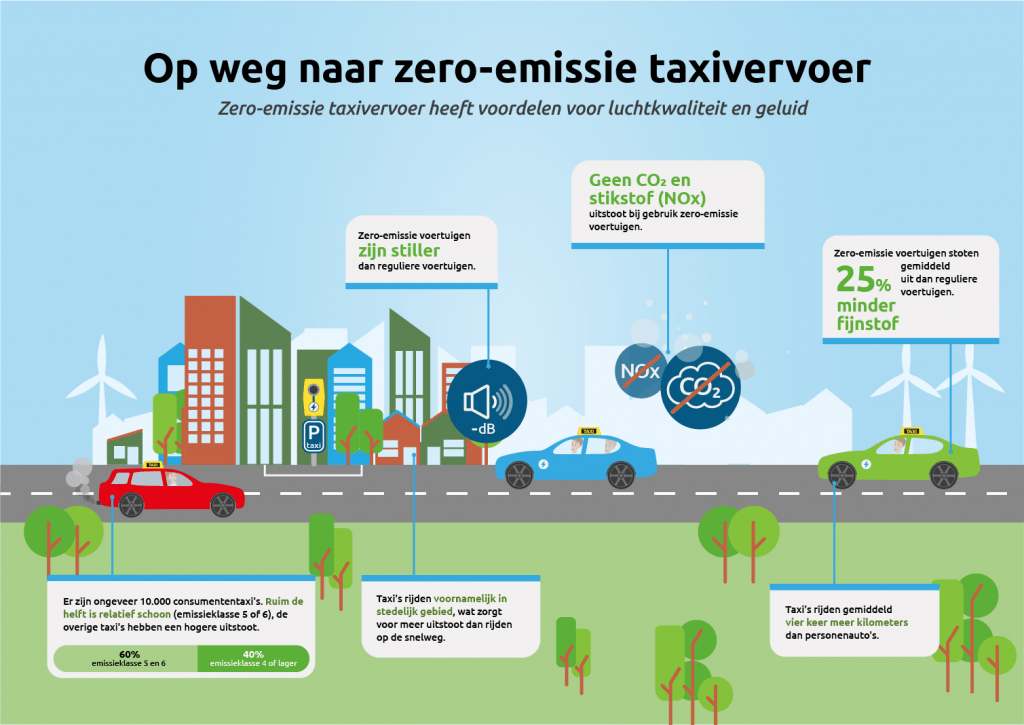All taxis in the Netherlands will be clean and quiet in 2030. And from 2025 in the big cities. Today, State Secretary Van Veldhoven is making agreements with six major cities and various parties in the taxi sector about this ambition. With this clear ambition, there will be clarity for taxi operators, who will be able to invest in clean and quiet taxis in the coming years. And it gives further substance to the agreement from the Climate Agreement to make transport more sustainable. The agreements will be further elaborated in the near future.
Free from exhaust fumes and quiet
Today, six large municipalities have signed the ambition to switch completely to emission-free taxis from 2025. The goal is that by 2025 all new taxis in those cities will be free of exhaust fumes. These are Amersfoort, Amsterdam, The Hague, Eindhoven, Rotterdam and Tilburg. In total, about three quarters of the total of ten thousand consumer taxis in the Netherlands drive around in these cities. There will be a national transition period for existing taxis. It is expected that more cities and parties will follow.
“This is a great step. Taxis drive an average of four times as many kilometers as passenger cars. If they all run electrically or on hydrogen, this is good for the clean air, the climate and there is less noise in the street. Good for the driver, the passenger and actually for everyone else in the city. We will work with the taxi operators to make the switch possible for them ”.
State Secretary Van Veldhoven
Towards a feasible transition
Today's appointments are a first step towards completely clean taxis throughout the Netherlands. An important starting point is that taxi operators are given time to make the switch. A taxi lasts an average of three to five years. Many entrepreneurs now have no opportunity to invest due to corona. That is why it has been agreed that there will be a good transition period, so that they can switch to an electric taxi or taxi on hydrogen when they are ready. There should be clarity about this term by the end of this year.
The preconditions are also being further elaborated. For example, municipalities are working to ensure that there are sufficient charging points for taxis, for example at taxi stands. The government is now working on regulations, so that the same rules will soon apply in all participating municipalities. There must be more clarity about this in 2022.
Realistic road map
One of the signatories is a trade association Royal Dutch Transport (KNV).
“We put our signature because we believe this is a realistic roadmap on the way to zero-emission taxis, if the preconditions are met. And that's important, because a healthy taxi industry is crucial for all those people who rely on the taxi to get home, to work or to school. ”
Chairman KNV healthcare transport and taxi Bertho Eckhardt
More and more clean taxis
The agreements are a confirmation of a trend that has been visible for some time and that parties have been working on for some time. About 5-10% of street taxis in the Netherlands currently drive emission-free. Many cities are working on the transition to clean taxis. Amsterdam already made the first agreements with the sector in 2016 about zero-emission taxis within the Ring. All taxis at Schiphol are already fully electric. Several dozen hydrogen taxis are driving around The Hague. And other drivers are also switching to hydrogen or electric. This can become interesting economically relatively quickly for taxis, because they drive many kilometers. Emission-free driving is much cheaper in terms of 'fuel' per kilometer than driving on diesel. In addition, electric cars are a lot cheaper to maintain. It has been agreed that the parties involved will further elaborate on how the switch from fossil to emission-free can become cheaper and more attractive for taxi operators.
Signatories
The following parties today sign the zero emission taxi roadmap:
- Municipality of Amersfoort
- Municipality of Amsterdam
- Municipality of The Hague
- Eindhoven municipality
- Municipality of Rotterdam
- Municipality of Tilburg
- Royal Dutch Transport (KNV)
- Lease plan
- Schiphol Taxi
- ElaadNL Foundation
- Dutch Sustainable Energy Association
- Uber
- Ministry of Infrastructure and Water Management


